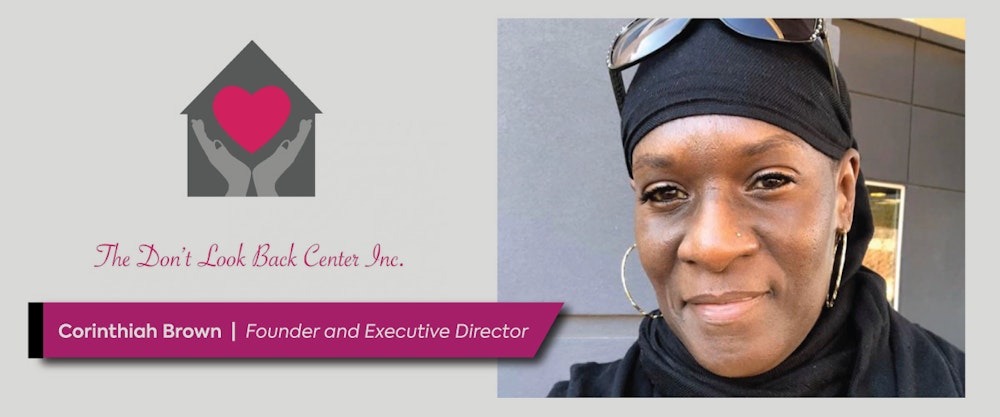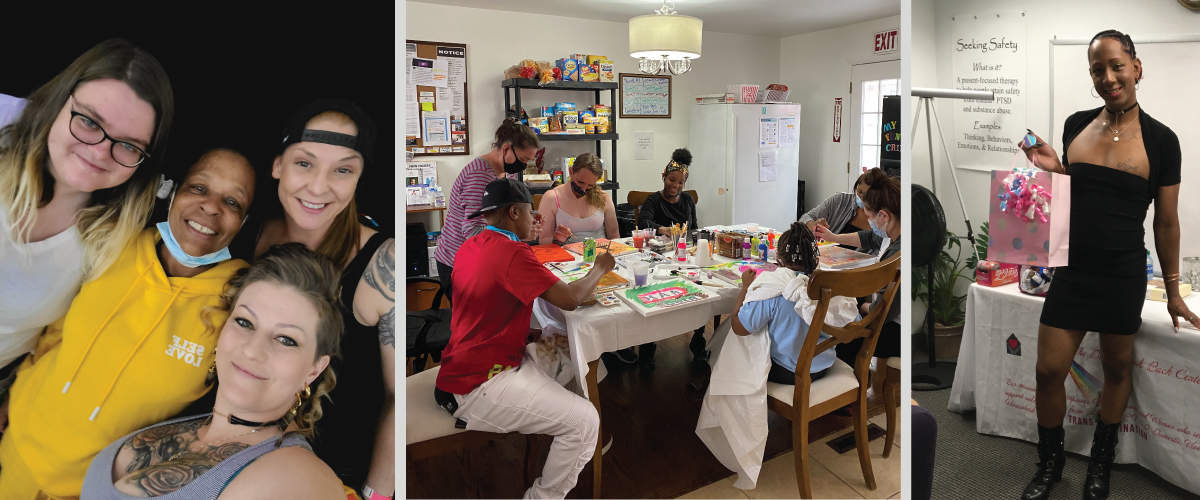
WOMEN AND TRANSWOMEN IN RECOVERY MOVE FORWARD WITH MENTAL AND PHYSICAL WELLNESS THANKS TO “DON’T LOOK BACK.”
The Don't Look Back Center
Corinthiah Brown, Founder and Executive Director
The Don’t Look Back Center (TDLBC) was created to empower socially and economically disadvantaged women and transwomen of all racial and ethnic backgrounds. The Center comes alongside these women, many of whom have experienced trauma, PTSD, domestic violence and addiction, and supports them in developing new skills and building new pathways to the lives they seek.
The Center’s clients have experienced homelessness; most have recent criminal justice involvement and have endured a variety of life traumas. Corinthiah Brown, the Founder and Executive Director of TDLBC, says that they actively seek out this population in their community outreach work and never refuse support to anyone.
Corinthiah says her own lived experience was what motivated her to start the Center. “There is a scripture that says, ‘Forget the former things, do not dwell on the past,’” she said. “But that’s hard when you have all this guilt and shame and there are some things that you have to go back and try to fix.” Corinthiah has been in recovery for 24 years, was previously in prison, and says she tried every type of treatment she could find.
From her many learned experiences, she knew she wanted the model for her Center to be a holistic approach to care. “You cannot help someone rebuild their life if you don't look at all areas, all aspects of a woman's life,” she said. “I knew we needed gender responsive services because women process things differently and we respond differently.”
“There is a huge stigma to being a woman in the criminal justice system, and the shame and guilt that comes with it,” she added. “That’s why TDLBC is licensed by the Office of Behavioral Health as a gender responsive outpatient substance use disorder treatment center, as well as a ecovery community center.”

Habilitation Empowerment Recovery (HER) Curriculum
HER is a culturally proficient, strength-based, and trauma-informed group counseling intervention designed for African American women who are engaged in problematic substance use and involved in the criminal justice system. Although HER focuses primarily on the experiences of African Americans, it may be delivered effectively to other women of color who share comparable experiences of racial or ethnic discrimination and negative cultural stereotypes.
All of the Center’s programs have a HER curriculum. “There's a huge lack of distrust from African Americans and Latina families about seeking care. We needed to create a place where they feel safe to have conversations,” Corinthiah said. “These women feel like they’re going against their family when they seek help, so there's extra shame added on top of it.”
“Helping them to stop using drugs is the last step in recovery,” Corinthiah explained. “We’ve got to address all the other things that led up to it. Their core beliefs, whatever traumas they experienced as a child, understanding that those things are what led someone to start using drugs in the first place.” She said that their program helps women identify how past experiences and family relationships are affecting them. And, when a black woman gets counseling from another black woman such as herself, Corinthiah says it also opens up conversations about seeking care and support for mental health.
In addition to other programs, TDLBC also offers a trans outreach program that serves transwomen, including nonbinary, by promoting safer sex practices, facilitating peer to peer groups about trans health care, behavioral health and substance abuse, and promoting wellness and recovery through education and peer support.
TDLBC connects women to what works best for them, not just a one-size-fits-all solution. “We help people set goals, and then break down achieving those goals into tangible, baby steps,” Corinthiah says. “It may be as simple as helping someone get an ID so that they can apply to school. We literally walk them through the entire process. And if a woman has a mental health diagnosis, we have an amazing clinical director who works with us and our clients as a team.”
One of the struggles for moms in recovery, especially those who are pregnant, is that often providers want to take them off of all their mental health medications. Corinthiah explains that you can’t just take someone off of all of the meds that are working. “When someone gets a mental health diagnosis and gets on medication that is giving them some balance, then the fear of a doctor stopping those meds drives pregnant women away from getting the help they need,” Corinthia explained. “Part of what we do is train women to know the questions they should ask their provider, including how mental health meds can be used safely during pregnancy and/or during recovery.”
Note to Providers:
Corinthia and her team offer tours, answer questions, explain their services and are available to talk about how you can work as a team referring patients to TDLBC and getting referrals from the Center as well. They are happy to meet in person or by Zoom.
Contact: (720) 638-8397
The Don’t Look Back Center Locations:
Aurora :
14211 E 4th Ave, Bldg. 3 Suite 305 Aurora, CO 80011
Denver:
1391 Delaware St Denver CO 80204
Housing - House of Rahab Aurora home & Denver home
Share this article:







